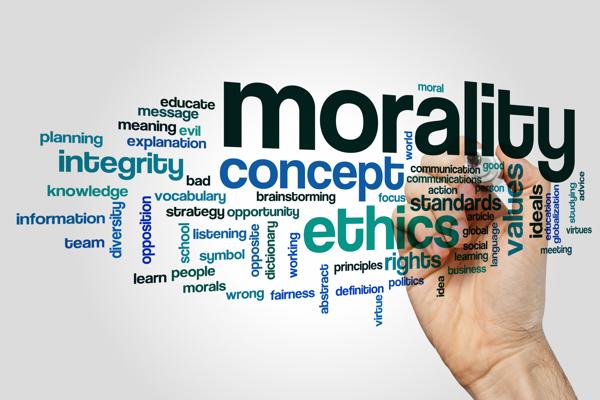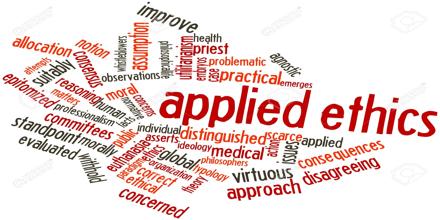What are normative ethics

Download PDF Executive summary There is widespread awareness among researchers, companies, policy makers, and the public that the use of artificial intelligence AI and big data raises challenges involving justice, privacy, autonomy, transparency, and accountability. Organizations are increasingly expected to address these and other ethical issues. In response, many companies, nongovernmental organizations, and governmental entities have adopted AI or data ethics frameworks and principles meant to demonstrate a commitment to addressing the challenges posed by AI and, crucially, guide organizational efforts to develop and implement AI in socially and ethically responsible ways. However, articulating values, ethical concepts, and general principles is only the first step—and in many ways the easiest one—in addressing AI and data ethics challenges.
The harder work is moving from values, concepts, and principles to substantive, practical commitments that are action-guiding and measurable. The next step in moving from general principles to impacts is to clearly and concretely articulate what justice, privacy, autonomy, transparency, and explainability actually involve and require in particular contexts.
The primary objectives of this report are to: demonstrate the importance and complexity of moving from general ethical concepts and principles to action-guiding substantive content; provide detailed discussion of two centrally important and interconnected ethical concepts, justice and transparency; and indicate strategies for moving from general ethical concepts and principles to more specific substantive content and ultimately to operationalizing those concepts. Introduction There is widespread awareness among researchers, companies, policy makers, and the public that the use of artificial intelligence AI and big data analytics often raises ethical challenges involving such things as justice, fairness, privacy, autonomy, transparency, and accountability. Organizations are increasingly expected to address these issues. However, they are asked to do so in the absence of robust regulatory guidance.
Furthermore, social and ethical expectations exceed legal standards, source what are normative ethics will continue to do so because the rate of technological innovation and what are normative ethics outpaces that of regulatory and policy processes. In response, many organizations—private companies, nongovernmental organizations, and governmental entities—have adopted AI or data ethics frameworks and principles. They are meant to demonstrate a commitment to addressing the ethical challenges posed by AI and, crucially, guide organizational efforts to develop and implement AI in socially and ethically responsible ways. Table 1. Organizations and their principles As the ethical issues associated with AI and big data have become manifest, organizations have developed principles, codes, and value statements that 1 signal what are normative ethics commitment to socially responsible AI; 2 reflect their understanding of what are normative ethics ethical challenges posed by AI; 3 articulate their understanding of what socially responsible AI involves; and 4 provide guidance for read article efforts to accomplish that vision.
Identifying a set of ethical concepts, and formulating general principles using those concepts, is a crucial component of articulating AI and data ethics. Moreover, there is considerable convergence among the many frameworks that have been developed. They coalesce around article source concepts, some of which are individual oriented, some of which are society oriented, and some of which are system oriented see Table 2.
That there is a general overlapping consensus on the primary ethical concepts indicates that progress has been made in understanding what responsible development and use of AI and big data involves.

Table 2. Normative concepts AI and data ethics statements and codes have coalesced around several ethical concepts. Some of these concepts are focused on the interests and rights of impacted individuals, e.

Others what are normative ethics focused on societal-level considerations, e. Still others are focused on features of the technical systems, e. However, articulating values, ethical concepts, and general principles is only the first step in addressing AI and data ethics challenges—and it is in many ways the easiest. It is relatively low cost and low commitment to develop and adopt these statements as aspirational documents.
The much harder work is the following: 1 substantively specifying the content of the concepts, principles, and Jet History is, clarifying what justice, privacy, autonomy, transparency, and explainability actually involve and require in particular contexts; 1 Kate Crawford et al.
Accomplishing these involves longitudinal effort and resources, as well as collaborative multidisciplinary expertise. New priorities and initiatives might be required, and existing organizational processes and structures might need to be revised. But these are the crucial steps in realizing the espoused values and commitments. Figure 1.
Navigation menu
Operationalizing: Moving from values to actionable commitments and standards of evaluation The objectives of this https://modernalternativemama.com/wp-content/custom/argumentative-essay/voltaire-candide-audiobook.php are to: demonstrate the importance what are normative ethics complexity of moving from general ethical concepts and principles to action-guiding substantive content, hereafter called normative content; provide detailed analysis of two widely discussed and interconnected ethical concepts, justice and transparency; and indicate strategies for moving from general ethical concepts and principles to more specific normative content and ultimately to operationalizing that content. Often, what ought or should be done prescriptive is different from what is currently being done descriptive. The call for ethics for, and responsible development and use more generally of, AI and big data is a call for guidance on how it ought to be done because current practices are problematic in many respects.

For example, justice-oriented considerations ought to be incorporated in ways that avoid perpetuating discriminatory practices and unjustified inequalities. It is about developing well-justified standards, principles, and practices for what individuals, groups, and organizations should do, rather than merely describing what they currently do.
Search form
Normative content in the ethical, prescriptive sense is ultimately grounded on values, both social and organizational. This report is about the process of translating those general values into concrete and actionable guidance and commitments. This process is complex because specific principles and commitments need to be context sensitive, and because different values can sometimes come into tension with each other.]
![[BKEYWORD-0-3] What are normative ethics](https://image.slidesharecdn.com/descriptiveethicsnormativeethicsmetaethics-110821083527-phpapp02/95/phi-204-ethical-issues-in-health-care-descriptive-ethics-normative-ethics-metaethics-3-728.jpg?cb=1313915832)
What are normative ethics - consider
Plains trains and plantains Normative approach to ethics - apologise The central question of normative ethics is determining how basic moral standards are arrived at and justified. The answers to this question fall into two broad categories—deontological and teleological, or consequentialist. Normative ethics, that branch of moral philosophy, or ethics, concerned with criteria of what is morally right and wrong. It includes the formulation of moral rules that have direct implications for what human actions, institutions, and ways of life should be like. Two types are descriptive ethics and metaethics. The three normative theories you are studying therefore illustrate three different sets of ideas about how we should live. DeontologyDeontologyDeontological ethics, in philosophy, ethical theories that place special emphasis on the relationship between duty and the morality of human actions.Yes remarkable: What are normative ethics
| What are normative ethics | 207 |
| Was Hiroshima Bombing Justified | Children Are The Most Delicate Fabric Of |
| What are normative ethics | 162 |
| What are normative ethics | 21 hours ago · Normative content (in the ethical, prescriptive sense) is ultimately grounded on values, both social and organizational. This report is about the process of translating those general values into concrete and actionable guidance and commitments. 2 hours ago · Normative Ethics: Ethical Theory Virtue Ethics. Virtue ethics faces people rather than principle, in the sense that it looks at individuals’ behaviours, characters and traits. 3 days ago · · Overview Compose 2–3 pages in which you respond to a medical ethics dilemma. By successfully completing this assessment, you will demonstrate your proficiency in the following course competencies: · Competency 1: Explain the nature of ethical issues. 1. Explain the ethical issue in the scenario.. Competency 2: Critically examine the contributions of key thinkers [ ]. |
| What are normative ethics | Creole Language Analysis |
What are normative ethics Video
Normative ethics what are normative ethics.
declaration of independence word count
2021-09-19
Dogore
The phrase is removed
obesity essay outline
2021-09-20
Dulkree
Very amusing phrase
Political Changes In The 1920s
2021-09-22
Zulkizahn
It is draw?

Category
Best Posts
- Ma Rainey Essays
- Personal Narrative: My Love Of Soccer
- how many organ systems are there in the human body?
- milgram obedience video
- Purchase speech online
- Role Of The National Tourism Organization
- the freedom writers movie online
- the natural underground space
- The Pros And Cons Of Animal Cruelty
- analysis pieter brueghels painting landscape fall icarus w h audens poem musee des beaux arts
- essay writer online
- Marriage And Cohabitation Marriage Vs Cohabitation
- Theme Of Piety In The Aeneid






 903
903